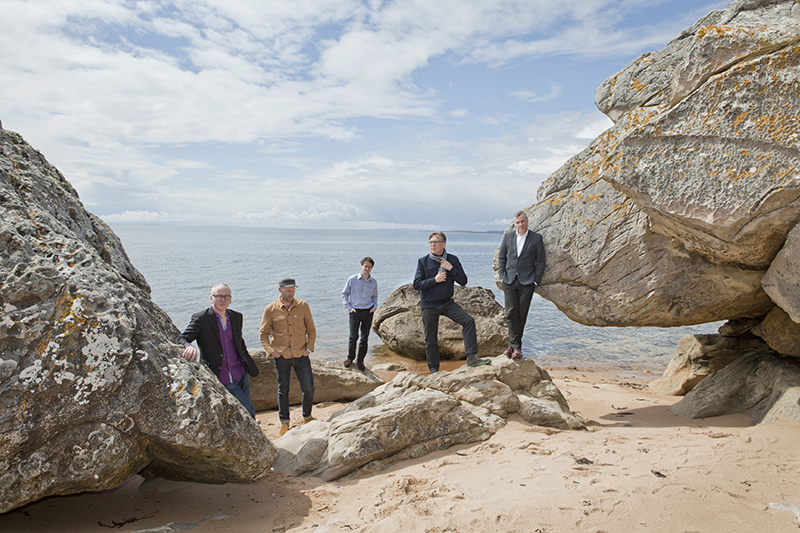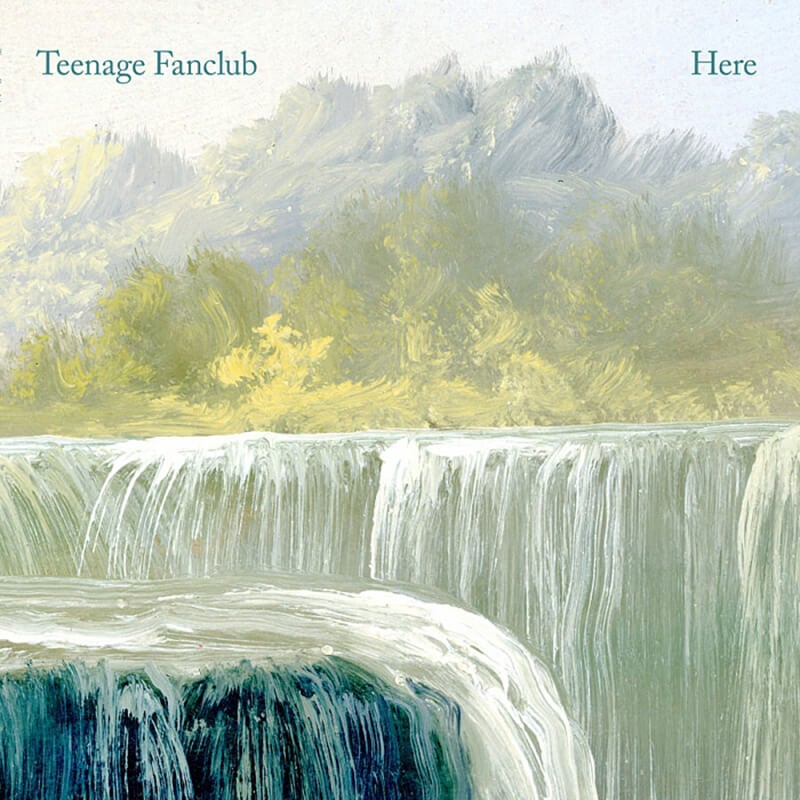Glasgow’s Teenage Fanclub have ridden the wave of alternative rock success at home and abroad for nearly three decades. The band’s timeless and beloved albums like Bandwagonesque and Songs from North Britain are filled with jangly, harmony-filled pop that harkens back to acts such as Big Star and R.E.M. “Start Again” from North Britain was even covered by former DGC/Geffen label mates, Counting Crows, on their 2012 release, Underwater Sunshine (Or What We Did on Our Summer Vacation).
Norman Blake, Raymond McGinley and Gerard Love continue their multi-songwriter approach on this year’s Here (Merge Records). We talked with Blake about the recording process, the band’s longstanding relationship with Superchunk and Merge, the changing landscape of the music industry and why great music will always be out made.
Performer Magazine: It’s been 25 years between what many consider your landmark album, Bandwagonesque, and your newest record, Here. Was that an intentional release time or just coincidental?
Norman: I guess it was just coincidental. It’s been six years since our last record. I can’t really explain why it’s taken so long. We all had other music projects and life events. I think we only get together to make an album when all of us feel we have enough material. Because there are three of us writing, we might not all be ready at the same time. We just have to wait until our stars aligned, which happened about three years ago. That’s when we started this record.

Teenage Fanclub photo by Donald Milne
PM: What was the recording process like for the new album?
NB: When we decide to make a record and everyone is ready to go, we meet up. I flew from Canada to Glasgow about two weeks before we were due to go into the studio, and we just ran through each other’s songs. I would play mine, and the other guys would play theirs, and then we would work on rough arrangements. Then we decamped to the south of France, where we found a lovely studio called Vega, which has a good EMI Desk. We always look for studios with great equipment, and we always like to go somewhere that’s not Glasgow because I think your environment affects what you’re doing while you’re working. If you go to an exotic location like the south of France, hopefully you feel a little more inspired. I think what works for us is going to a place we’ve never been before.
We spent about three weeks down there, and pretty much recorded all of the music. We hadn’t finished the vocals; we tend to not finish vocals until very late in the process. We then went our separate ways and ruminated for a few months and listened to what we had. Then we reconvened at Raymond [McGinley]’s house in Glasgow. He’s got some nice recording equipment there, so we started recording vocals with each of us taking turns. As we always do, the lyrics are written while we’re recording the vocal parts. Invariably, you’re influenced by what other people are doing and the themes that they’re singing about — which is why the lyrics have a similar theme across the whole album even with three different writers.
In terms of mixing, we wanted to get away again, so we found a great studio in Hamburg called Clouds Hill Recordings, which again had fantastic equipment. We spent three weeks there mixing the album, and that was about a year ago. I think we missed our first slot for our release in the Merge [Records] schedule, so we had to wait. It’s nice to finally have it out, and it’s very exciting for us. We just wanted to take our time and make sure we had it right.

Teenage Fanclub – Here
PM: How did you get involved with Merge?
NB: This is our third album with Merge, but our story with the members of Superchunk goes way back to 1989 or 1990. We were both artists on Matador Records as it was just starting. Our first album [A Catholic Education] was Matador’s third release and Superchunk’s self-titled album was the fourth or fifth. When Matador had a launch for the label at CBGB’s in 1990, that was our first trip to the U.S., and Superchunk was on that bill. That was the first time we met them, and we did some more shows together around that time. Superchunk came and toured the UK with us, so we’ve known those guys a long time. We like them a lot as people, and we’ve always had a great deal of respect for them. I think when it came to releasing our Man-Made album with Merge in 2005, it just seemed like a natural home. Our relationship with the label has been great. It’s the sort of label that when we were talking about making Here, they didn’t have to hear anything. They just told us to send it over when we were finished, and they’d release it. Not many labels would do that, so it’s nice that they respect us and appreciate what we do with no caveats.
PM: A lot of bands interviewed in the Merge biography, Our Noise, seem to share that feeling of little pressure to deliver certain kinds of records on a strict deadline.
NB: And they’re still a bunch of fun people. We came down for their 25th anniversary shows, which were a lot of fun. We got to meet a lot of those other bands, and we’ve certainly enjoyed being a part of everything they’ve done. It’s the best home for us in the United States, for sure.
PM: A lot has been made about the fact that Teenage Fanclub has three songwriters, which can be rare in most rock bands these days. Why do you think it was important to have that structure in the beginning, and how do you feel it has helped the band in the long run?
NB: I think the dynamic of every group is different, and every group has a different way of operating. This just happens to be the way that works for us. I think fairly early on we decided it would beneficial for everyone to try to contribute to the records in terms of songwriting. The way we look at it, we’re ten albums in, and it’s a tall order for one writer to handle all of that. It’s hard enough to write five songs by yourself, let alone fifty or sixty. Being able to maintain a certain level of quality is difficult. We tend to look at it as spreading the workload, which has hopefully helped us maintain a good standard of music throughout the years.
It’s actually even helped working with other artists. I’ve worked a lot with Jad Fair of Half-Japanese and so has the band. Teenage Fanclub actually made an album with him [Words of Wisdom and Hope], which was a lot of fun. He brings his very different approach to the recording session, which made the whole experience very exciting for us.
PM: Teenage Fanclub came into the scene during the “alternative boom” of the late 80s and early 90s. Since then, the music business has obviously shifted. What has been the biggest change you’ve witnessed?
NB: There’s certainly less money for bands to make music or tour. It’s easier technologically to make records because you can make it with a laptop now. In terms of people buying them, that’s a lot harder. Things are so accessible, it’s no surprise people are selling less than they used to. Bands now have to take on extra jobs to even pay your rent, which means they can’t get on the road as much. There’s always been great music being made, but it’s a good bit harder for artists now. I was actually talking to someone today [about this]. Artists like David Bowie didn’t have a hit until their third album, but the label had allowed him to make three albums. Today, you probably don’t even get one album to make a hit. It’s going to be a lot harder, but people are still going to make great music.
photos by Donald Milne
